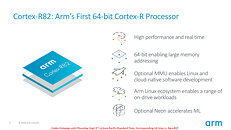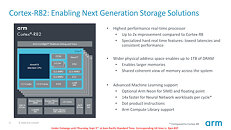Mar 30th, 2025 05:42 EDT
change timezone
Latest GPU Drivers
New Forum Posts
- Future-proofing my OLED (72)
- 13500 or 14500 or 12700 or 12700k (1)
- The TPU UK Clubhouse (26008)
- AAF Optimus Modded Driver For Windows 10 & Windows 11 - Only for Realtek HDAUDIO Chips (383)
- RTX 5080 - performance fluctuation (7)
- Is the futureproof gaming solution a four drive system? (11)
- Problem solved (0)
- What are you playing? (23314)
- Can you guess Which game it is? (20)
- Windows 10 Vs 11, Which one too choose? (125)
Popular Reviews
- Sapphire Radeon RX 9070 XT Pulse Review
- ASRock Phantom Gaming B850 Riptide Wi-Fi Review - Amazing Price/Performance
- Samsung 9100 Pro 2 TB Review - The Best Gen 5 SSD
- Palit GeForce RTX 5070 GamingPro OC Review
- Assassin's Creed Shadows Performance Benchmark Review - 30 GPUs Compared
- Sapphire Radeon RX 9070 XT Nitro+ Review - Beating NVIDIA
- ASRock Radeon RX 9070 XT Taichi OC Review - Excellent Cooling
- Enermax REVOLUTION D.F. 12 850 W Review
- AMD Ryzen 7 9800X3D Review - The Best Gaming Processor
- AMD Ryzen 9 9950X3D Review - Great for Gaming and Productivity
Controversial News Posts
- AMD RDNA 4 and Radeon RX 9070 Series Unveiled: $549 & $599 (260)
- MSI Doesn't Plan Radeon RX 9000 Series GPUs, Skips AMD RDNA 4 Generation Entirely (142)
- Microsoft Introduces Copilot for Gaming (124)
- AMD Radeon RX 9070 XT Reportedly Outperforms RTX 5080 Through Undervolting (119)
- NVIDIA Reportedly Prepares GeForce RTX 5060 and RTX 5060 Ti Unveil Tomorrow (115)
- Over 200,000 Sold Radeon RX 9070 and RX 9070 XT GPUs? AMD Says No Number was Given (100)
- NVIDIA GeForce RTX 5050, RTX 5060, and RTX 5060 Ti Specifications Leak (96)
- Retailers Anticipate Increased Radeon RX 9070 Series Prices, After Initial Shipments of "MSRP" Models (90)
Thursday, September 3rd 2020

Arm Announces Cortex-R82: The First 64-bit Real Time Processor to Power the Future of Computational Storage
There is expected to be more than 79 zettabytes of IoT data in 2025, but the real value of this data is found in the insights it generates. The closer to the data source we can produce these insights the better, because of the improved security, latency and energy efficiency enabled. Computational storage is emerging as a critical piece of the data storage puzzle because it puts processing power directly on the storage device, giving companies secure, quick and easy access to vital information.
Our expertise and legacy in storage puts Arm in a strong position to address the changing needs of this market - with around 85% of hard disk drive controllers and solid-state drive controllers based on Arm, we are already a trusted partner for billions of storage devices. Today, we're announcing Arm Cortex-R82, our first 64-bit, Linux-capable Cortex-R processor designed to accelerate the development and deployment of next-generation enterprise and computational storage solutions.Generating insight where data is stored
For processing to take place closer to the data, we needed to deliver higher performance. The new Arm Cortex-R82 provides up to 2x performance uplift, depending on the workload, compared to previous Cortex-R generations. This will allow storage applications to run new workloads like machine learning at a lower latency, with optional Arm Neon technology to provide additional acceleration. Cortex-R82 is 64-bit, providing access of up to 1 TB of DRAM for advanced data processing in storage applications.
Storage controllers traditionally run bare-metal/RTOS workloads to store and access data, however Cortex-R82 introduces an optional memory management unit (MMU) to allow for rich operating systems to run directly on the storage controller, creating the opportunity for new and improved applications that will benefit both consumers and businesses.
Creating value across a range of applications
Processing data where it is stored opens huge opportunities across applications including IoT, ML and edge computing. This is critical in the storage use cases you might expect, such as database acceleration, meaning no movement of large files and increased security and privacy, and video transcoding where data can be efficiently transcoded or encoded for streaming, adapting different bit rates and resolutions as necessary. But it's also increasingly important for applications such as transportation - for example, modern airplanes generate terabytes of data a day that is usually offloaded for analysis. Computational storage offers airlines real-time analysis of this data on the drive, so when a plane lands, they can ensure it's safe for the next flight in 30 minutes or less, enabling faster turnaround and better safety for passengers.
Flexibility is the name of the game
As the storage market evolves, one of the biggest requirements we've seen from our partners is flexibility. The new features of the Cortex-R82 processor give partners the possibility to design multi-core implementations of up to 8 cores, and adjust the types of workload running on the storage controller based on external demands in software. For example, parking lots will regularly use video surveillance to recognize license plate information which is later used for billing. During the day vehicle registration plate data is collected, meaning most cores are being used for intensive storage. At night, these cores will be used to process the data for billing and will adjust to carry out the data analysis and machine learning needed. As storage controllers are becoming more diverse to address different markets and features, Cortex-R82 delivers an architecture to provide this extreme flexibility - reducing costs and time to market.
Enabling a faster start for developers
In order to develop the SoCs needed for these future use cases, our partners need access to easy and cost-effective technology - and perhaps more importantly, they need to know that the software just works. We are always looking at ways to reduce complexity and cost for our partners, which is why we ensured Cortex-R82 could leverage the power of the Arm Linux and server ecosystems. The ability to run Linux gives developers a whole new set of software tools and technologies, such as Docker and Kubernetes, to use for their storage applications, providing an accelerated method of implementation. The Cortex-R82 also takes advantage of Arm's security foundations and is compatible with Arm TrustZone, ensuring isolation of the storage controller firmware from other Linux or real-time workloads.
Arm designed Cortex-R82 because in a world of billions of connected devices, data processing can no longer only happen in the cloud. Cortex-R82 will help to ensure companies can generate insights and extract the most value out of their future IoT deployments more efficiently and securely.
Our expertise and legacy in storage puts Arm in a strong position to address the changing needs of this market - with around 85% of hard disk drive controllers and solid-state drive controllers based on Arm, we are already a trusted partner for billions of storage devices. Today, we're announcing Arm Cortex-R82, our first 64-bit, Linux-capable Cortex-R processor designed to accelerate the development and deployment of next-generation enterprise and computational storage solutions.Generating insight where data is stored
For processing to take place closer to the data, we needed to deliver higher performance. The new Arm Cortex-R82 provides up to 2x performance uplift, depending on the workload, compared to previous Cortex-R generations. This will allow storage applications to run new workloads like machine learning at a lower latency, with optional Arm Neon technology to provide additional acceleration. Cortex-R82 is 64-bit, providing access of up to 1 TB of DRAM for advanced data processing in storage applications.
Storage controllers traditionally run bare-metal/RTOS workloads to store and access data, however Cortex-R82 introduces an optional memory management unit (MMU) to allow for rich operating systems to run directly on the storage controller, creating the opportunity for new and improved applications that will benefit both consumers and businesses.
Creating value across a range of applications
Processing data where it is stored opens huge opportunities across applications including IoT, ML and edge computing. This is critical in the storage use cases you might expect, such as database acceleration, meaning no movement of large files and increased security and privacy, and video transcoding where data can be efficiently transcoded or encoded for streaming, adapting different bit rates and resolutions as necessary. But it's also increasingly important for applications such as transportation - for example, modern airplanes generate terabytes of data a day that is usually offloaded for analysis. Computational storage offers airlines real-time analysis of this data on the drive, so when a plane lands, they can ensure it's safe for the next flight in 30 minutes or less, enabling faster turnaround and better safety for passengers.
Flexibility is the name of the game
As the storage market evolves, one of the biggest requirements we've seen from our partners is flexibility. The new features of the Cortex-R82 processor give partners the possibility to design multi-core implementations of up to 8 cores, and adjust the types of workload running on the storage controller based on external demands in software. For example, parking lots will regularly use video surveillance to recognize license plate information which is later used for billing. During the day vehicle registration plate data is collected, meaning most cores are being used for intensive storage. At night, these cores will be used to process the data for billing and will adjust to carry out the data analysis and machine learning needed. As storage controllers are becoming more diverse to address different markets and features, Cortex-R82 delivers an architecture to provide this extreme flexibility - reducing costs and time to market.
Enabling a faster start for developers
In order to develop the SoCs needed for these future use cases, our partners need access to easy and cost-effective technology - and perhaps more importantly, they need to know that the software just works. We are always looking at ways to reduce complexity and cost for our partners, which is why we ensured Cortex-R82 could leverage the power of the Arm Linux and server ecosystems. The ability to run Linux gives developers a whole new set of software tools and technologies, such as Docker and Kubernetes, to use for their storage applications, providing an accelerated method of implementation. The Cortex-R82 also takes advantage of Arm's security foundations and is compatible with Arm TrustZone, ensuring isolation of the storage controller firmware from other Linux or real-time workloads.
Arm designed Cortex-R82 because in a world of billions of connected devices, data processing can no longer only happen in the cloud. Cortex-R82 will help to ensure companies can generate insights and extract the most value out of their future IoT deployments more efficiently and securely.
Mar 30th, 2025 05:42 EDT
change timezone
Latest GPU Drivers
New Forum Posts
- Future-proofing my OLED (72)
- 13500 or 14500 or 12700 or 12700k (1)
- The TPU UK Clubhouse (26008)
- AAF Optimus Modded Driver For Windows 10 & Windows 11 - Only for Realtek HDAUDIO Chips (383)
- RTX 5080 - performance fluctuation (7)
- Is the futureproof gaming solution a four drive system? (11)
- Problem solved (0)
- What are you playing? (23314)
- Can you guess Which game it is? (20)
- Windows 10 Vs 11, Which one too choose? (125)
Popular Reviews
- Sapphire Radeon RX 9070 XT Pulse Review
- ASRock Phantom Gaming B850 Riptide Wi-Fi Review - Amazing Price/Performance
- Samsung 9100 Pro 2 TB Review - The Best Gen 5 SSD
- Palit GeForce RTX 5070 GamingPro OC Review
- Assassin's Creed Shadows Performance Benchmark Review - 30 GPUs Compared
- Sapphire Radeon RX 9070 XT Nitro+ Review - Beating NVIDIA
- ASRock Radeon RX 9070 XT Taichi OC Review - Excellent Cooling
- Enermax REVOLUTION D.F. 12 850 W Review
- AMD Ryzen 7 9800X3D Review - The Best Gaming Processor
- AMD Ryzen 9 9950X3D Review - Great for Gaming and Productivity
Controversial News Posts
- AMD RDNA 4 and Radeon RX 9070 Series Unveiled: $549 & $599 (260)
- MSI Doesn't Plan Radeon RX 9000 Series GPUs, Skips AMD RDNA 4 Generation Entirely (142)
- Microsoft Introduces Copilot for Gaming (124)
- AMD Radeon RX 9070 XT Reportedly Outperforms RTX 5080 Through Undervolting (119)
- NVIDIA Reportedly Prepares GeForce RTX 5060 and RTX 5060 Ti Unveil Tomorrow (115)
- Over 200,000 Sold Radeon RX 9070 and RX 9070 XT GPUs? AMD Says No Number was Given (100)
- NVIDIA GeForce RTX 5050, RTX 5060, and RTX 5060 Ti Specifications Leak (96)
- Retailers Anticipate Increased Radeon RX 9070 Series Prices, After Initial Shipments of "MSRP" Models (90)



11 Comments on Arm Announces Cortex-R82: The First 64-bit Real Time Processor to Power the Future of Computational Storage
What about now ?.
I know I sound like your classical anti-IoT doomsday conspiracy theorist but I really don't need any more devices connected to everything out there sending data from all sort of sensors. I have one at home, my PC, and one with me, my phone. That's enough surveillance, which is what "IoT" is really for.
I'm sorry Dave, I can't allow that.